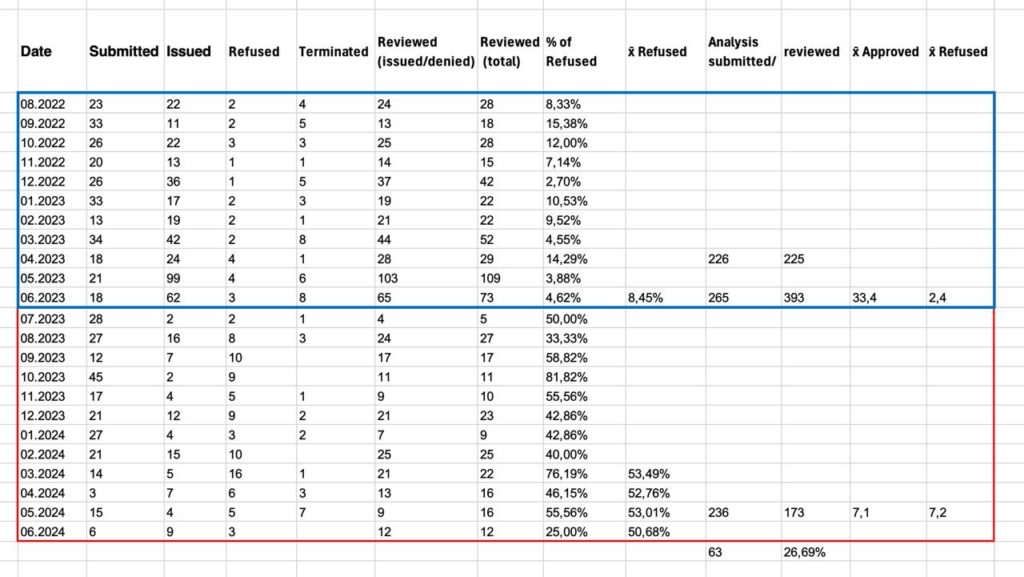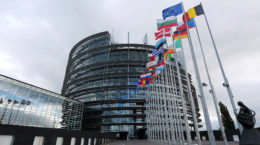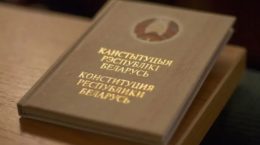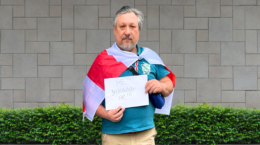MONITORING REPORT of International Centre for Civil Initiatives “Our House”.
The International Center for Civil Initiatives “Our House” has prepared a report on the mass discrimination of Belarusians as an ethnic minority in Lithuania, including pressure on human rights defenders and activists, attempts to deport Belarusian democratic activists and conscientious objectors back to Belarus, mass unfounded accusation of Belarusians as a threat to national security on fabricated grounds, discrimination against Belarusian businesses, and more.
The International Center for Civil Initiatives “Our House” is a Belarusian public human rights organization registered in Vilnius (Lithuania) since 2014 and currently operating in exile in Lithuania.
The International Center for Civil Initiatives “Our House” has been nominated for the Nobel Peace Prize in 2024 and has received many international human rights awards:
- 2023 – Sean MacBride Peace Prize, Germany
- 2022 – Human Rights Award of the City of Weimar, Germany
- 2019 – International Peace Award, Bremen, Germany
The director of the International Center for Civil Initiatives “Our House,” Olga Karach, has also received international awards:
- 2023 – Alexander Langer International Peace Prize, Italy
- 2010 – International Award “For Civil Courage,” Radebeul, Germany
- 2007 – “Person of the Year,” Amnesty International for Belarus (for excellence in Human Rights defense)
The goal of the human rights organization “Our House” is active and broad protection of human rights and support for the most vulnerable and marginalized groups, with a special focus on women and children, who are easily victimized by human rights violations in Belarus. The organization also supports refugees from Belarus and Ukraine in Lithuania and other EU countries. Due to the war in Ukraine, the organization now prioritizes broad support for Belarusian conscientious objectors and deserters to prevent the Belarusian army from invading Ukraine.
The International Center for Civil Initiatives “Our House” aims to fill gaps in human rights protection not covered by other organizations and to coordinate its activities with relevant organizations.
In assessing the collected data, the human rights defenders of “Our House” relied on specific cases of Belarusians in Lithuania, documents provided by Belarusians, their professional knowledge, many years of experience in human rights protection, and public sources including official data from the Lithuanian Migration Department, the Lithuanian Department of National Security, and independent media. We thank our partners and colleagues for additional information. This thematic report is for informational purposes only and does not create or entail rights or legal obligations in individual cases.
Monitoring of Belarusian rights in Lithuania is complicated by previous traumatic experiences of Belarusians subjected to repression in Belarus and acute post-traumatic syndrome among those who fear deportation to Belarus as a reaction of Lithuanian state bodies if they report discrimination and violations of their rights in Lithuania.
Content:
-
General situation with Belarusians in Lithuania.
-
Massive denials of political asylum to Belarusians who have come under repression, in violation of Directive 2011/95/EU and the Refugee Convention.
-
Mass unfounded accusation of Belarusians as a threat to the national security of Lithuania
-
Cooperation between Lithuanian government agencies and Belarusian government agencies, which led to new repressions against Belarusian democratic activists.
-
Recommendations
Summary:
As of April 1, 2024, 62,884 citizens of Belarus[1][2] legally reside in Lithuania. At the moment, the state policy of Lithuania and the work of socio-political institutions controlled by the ruling party, including the media and bloggers, are aimed at creating hostile and discriminatory conditions for Belarusians in Lithuania. There is a hidden push out of Belarusians from Lithuania to other countries.
In Lithuania, the following rights and basic legal principles are grossly violated against Belarusians:
– the principle of equality regardless of origin is violated;
– the right to freedom, life and integrity is violated;
– the practice of deporting democratic activists and conscientious objectors to the Republic of Belarus contributes to forced labor (slavery) and torture, and also increases the risk of dying in a Belarusian prison due to lack of access to medical care and from torture;
– the principle of legal personality is violated;
– the right to work is violated;
– the right to judicial protection in the face of the law is limited and there is no possibility of restoration of rights by the court;
– there are arbitrary expulsions without evidence of guilt;
– the principle of presumption of innocence has been massively violated
– punishment of Belarusians is based on assumptions and conjectures, and not on the facts of committing a crime;
– the principle of family integrity is violated;
– freedom of expression is violated;
– freedom of thought, conscience and religion is violated.
Thus, in Lithuania, a number of articles of the Universal Declaration of Human Rights, the Convention against Torture and other fundamental documents are violated in relation to Belarusians.
According to the Belarus Business Center, Lithuania has become a leader in discrimination against owners of Belarusian origin. The result of these discriminatory practices was a 37% reduction in the number of their businesses in Lithuania in 2023[3] (from 1345 to 850[4]).
In violation of Directive 2011/95/EU and the Refugee Convention, the Lithuanian Migration Department unmotivatedly refuses to grant political asylum to Belarusians.
During the period from August 2022 to May 2024, the average percentage of refusals of political asylum to Belarusians in Lithuania increased more than 6 times[5].
The number of cases considered on requests for political asylum of Belarusians has decreased, and a significant (more than 30%) number of “stuck” cases has appeared. They can also affect statistics in the future.
A sharp jump in the average percentage of refusals of political asylum for Belarusians occurred in mid-to-late summer of 2023, when problems associated with the so-called “Litvinism” and mass unfounded accusation of Belarusians as a “threat to the national security of Lithuania” began to spread.
For the entire period under review – from August 2022 to May 2024:
- applications submitted: 495
- considered: 554 (or 619, if the “applications submitted” are taken into account “termination of asylum” – there is no exact information).
According to the data, two clear periods can be seen – from 08.2022 to 06.2023 (average rejection rate 8.45%) and from 07.2023 to 05.2024 (average rejection rate 53.01%). A sharp jump in the percentage of refusals appeared on 07.2023 – 50.0% compared to the previous month from 4.62% (a one-time increase of more than 10 times). The percentage of refusals of political asylum to Belarusians, for example, in March 2024 was 76.19%, which directly indicates a worsening anti-migrant and anti-Belarusian government policy.

Despite the huge number of resolutions and reports about mass violations of human rights in Belarus, arrests and persecution of democratic activists, human rights defenders, journalists and conscientious objectors, the main wording of the refusal of political asylum of the Lithuanian Department of Migration is that Belarusians who participated in the protests, as well as independent journalists, anti-war activists and conscientious objectors are not threatened in Belarus and it is safe for them to go back. At the same time, because it is practically impossible for a Belarusian asylum seeker to obtain another status for legalisation in Lithuania, if denied political asylum, a Belarusian activist, human rights defender or journalist turns out to be illegal in the territory of Lithuania and other EU countries with the risk of deportation to Belarus. The Department of Migration intimidates Belarusians who have been refused political asylum with threats of deportation, forcing them to leave for third countries.
In fact, there is an active hidden pushing out of repressed Belarusians from Lithuania and the EU to third countries, where it is not safe for Belarusian democratic activists and conscientious objectors to stay, because there is a practice of their extradition to Belarus. Denial of asylum and humanitarian visa in Lithuania applies to all countries of the Schengen Agreement. Thus, those who receive such a refusal are deprived of any possibility of staying and their legalisation in a safe country.
It should be noted that Belarusians apply for political asylum only in the most extreme case, if there is no other possibility of legalisation (economic residence permit, humanitarian residence permit, family residence permit, etc.). For example, from August 2022 to March 2024, Belarusians filed only 465 applications for political asylum. The reluctance of Belarusians to apply for political asylum in Lithuania is connected with the ban on work for asylum seekers in the complete absence of any state support. Asylum seekers find themselves in a very difficult financial situation and are forced to work illegally to support themselves and their families. At the same time, many of them have survived torture in Belarus, suffer from acute post-traumatic stress disorder and need psychiatric help and medical drugs to which they have no access.
The Lithuanian Department of National Security manipulates and abuses the notion of “threat to the national security of Lithuania” in relation to Belarusians, massively adding them to the lists of “persons threatening the national security of Lithuania” – not on the basis of real threats and facts of committing crimes, but only on the basis of assumptions, suspicions, rumours, that is why the same wording “may be a threat to national security” usually appears in the documents. This “may be“, i.e. assumption is enough to declare a person a threat to the national security of Lithuania and to deprive him of his legal status in Lithuania, as well as to include him in the European databases of persons threatening security with a ban on entry to the EU from 3 to 5 years (there is a case when an anti-corruption investigator was included in these lists for life, i.e. forever). The inclusion of Belarusians in the lists of threats to national security of Lithuania makes it practically impossible to legalise Belarusians in another EU country, which poses a threat to freedom, health and life of Belarusians who have fallen under repression in Belarus and for this reason have no possibility to return to Belarus. The lists of threats to national security include victims of state slavery, electricians, accountants, bankers, firemen, former employees of state bodies, conscientious objectors, etc., i.e. people who had connections with the army or state organisations of Belarus in the past.
Also on the lists of threats to Lithuania’s national security were anti-nuclear activists, Belarusan researchers who investigated Belarusan-Lithuanian corruption schemes, Belarusan human rights activists defending the rights of Belarusans in Lithuania, etc. All these categories of Belarusan citizens face immediate deportation to Belarus with the risk of imprisonment in Belarus for their social, political, civic activity and their beliefs. At the moment we know about at least two cases of illegal decision-making by the Lithuanian Department of Migration on deportation of democratic activists and conscientious objectors to Belarus.
On 17 April 2024, the National Security and Defence Committee of the Lithuanian Parliament adopted amendments to the draft law, where Belarusians who travel to Belarus more than once every three months[6] will also be unfounded accused as a threat to Lithuania’s national security. The absence of evidence of a threat to national security in court contradicts the principle of presumption of innocence, and the absence of the obligation of the Lithuanian Department of National Security to provide evidence of a threat to national security in court deprives a person of the right to an objective trial and legal personality.
In just one year (from November 2022 to November 2023), 1644 citizens of Belarus and 300 citizens of Russia were unfounded accused as a threat to national security, which directly indicates the biased and discriminatory nature of the attitude to Belarusians and Belarus[7]. Despite the large number of Belarusians unfounded accused as a threat to the national security of Lithuania, there is only one known public case of detention of a Belarusan citizen for espionage in Lithuania for almost 63,000 Belarusians[8]. Most espionage in favour of the KGB (Committee for State Security) of Belarus is carried out by Lithuanian citizens.
In Lithuania, a number of anti-Belarusian Lithuanian politicians launched active political manipulations and speculations on the subject of fictitious territorial claims of Belarusians to Vilnius and doubts of Belarusians in the territorial integrity of Lithuania. In reality, Belarusians of Christian-conservative views, who want to distance themselves as much as possible from the Soviet past of Belarus and any ties with Russia, and who are in favour of Belarus’ accession to the European Union and NATO, call themselves “Litvins”. So far, no Lithuanian politician or Lithuanian journalist has cited a single case when a Belarusian politician, activist, human rights activist, journalist questioned the territorial integrity of Lithuania or said that Vilnius should be returned to Belarus. Nevertheless, the Minister of Defence of Lithuania and the former chairman of the Committee on Defence and National Security of the Lithuanian Seimas Laurynas Kaščiūnas[9], as well as some other Lithuanian politicians attribute “anti-Lithuanian” sentiments to the Belarusian diaspora in Lithuania without grounds and on the basis of their own speculations, for some reason calling it “Litvinism“[10][11]. The absence of any proofs of territorial claims of Belarusians did not prevent Lithuanian politicians from even talking about criminal responsibility for “Litvinism”. Once again the presumption of innocence does not apply to Belarusians in Lithuania, and decisions on Belarusians are made on the basis of speculations, rumours and political speculations of ultra-right Lithuanian politicians like Lithuanian Minister of Defence Laurynas Kaščiūnas[12].
In the Lithuanian media there is a harassment and active use of hate speech against Belarusan migrants and refugees. High-ranking politicians (Lithuanian President Nauseda[13][14][15][16], Minister of Defence and former chairman of the Committee on National Security and Defence of the Lithuanian Parliament Kasciunas, Minister of Internal Affairs Bilotaite and others), a number of public institutions, including the Lithuanian Department of National Security of Lithuania, participate in the harassment of Belarusians. Here are typical headlines in the Lithuanian media, which are intended to form in Lithuanian readers a hostile and negative attitude to Belarusians as an ethnic group: “The Department of State Security of Lithuania warns about the threat coming from Belarusians“[17], “The adviser of the Lithuanian president considers Belarusians as a fifth column“[18], “The head of the Lithuanian Interior Ministry hopes that politicians will make a decision to unify sanctions against citizens of Russia and Belarus“[19] (Bilotaite: “Taking into account what is related to the security situation, we believe that it is worth reconsidering a return to similar regulation of sanctions against citizens of Belarus“), “Lithuania proposes to tighten restrictions for citizens of Belarus“[20], etc.
Lithuanian politicians publicly call for a legal ban on Belarusians from applying to Lithuanian courts to challenge decisions of the Lithuanian Department of Migration and the Lithuanian Department of National Security to deny political asylum or to revoke residence permits[21].
The Lithuanian Department of Migration publicly calls attempts by Belarusians to appeal against refusals of political asylum “abuse”, thus publicly denying the very right of Belarusians in Lithuania to a fair trial[22].
In the Lithuanian media there are open calls for violent actions against Belarusians. For example, blogger Algis Ramanauskas openly calls to deface cars with Belarusian licence plates, openly calls Belarusians “persons of extremely low social quality”, “sick people”, “biomass“[23]. In Lithuania there appeared “hunters for Litvins” (“Litvins” – this is how pro-European Belarusians, who try to distance themselves from the Soviet past of Belarus, call themselves), i.e. “hunters for Belarusians”, who are engaged in disrupting cultural events, which are held by the Belarusan diaspora in Lithuania[24], as well as in other attacks against Belarusians. Personal SMS and messenger messages of Belarusians often contain threats in Lithuanian, death threats to adults and children, sometimes signed Bloody Nazi and writing that Lithuania is for Lithuanians[25].
Anti-Belarusian discriminatory laws are constantly adopted.
On 25 April 2024, the Lithuanian Seimas extended national sanctions against Russian and Belarusian citizens for a year. According to the law adopted last year, Russians and Belarusians are restricted in their ability to obtain Lithuanian visas and electronic residence status, the ability of Russian and Belarusian citizens to come to Lithuania and purchase property is further complicated, and their applications for residence permits in Lithuania are temporarily not accepted. This law very seriously hit Belarusians who are in opposition to Alexander Lukashenko and the Belarusan regime. At the same time, employees of the KGB, Belarusian propaganda and those who openly support Aliaksandr Lukashenka’s regime were not affected by the imposed sanctions[26].
In Lithuania, all conditions are created so that it is impossible to appeal against a decision to cancel a residence permit or a refusal of political asylum, i.e. in essence, a Belarusan is deprived of access to legal protection. Since July 1, 2024, the decision to cancel a residence permit in Lithuania comes into force immediately, but not suspended, as it was before. Previously, a foreigner who filed a complaint with the court was left with a residence permit and residence permit card for the duration of the court proceedings. Now, regardless of whether the Belarusian complained about the decision of the department or not, he must leave the territory of Lithuania within 14 days after the cancellation of residence permit. Otherwise, he will be issued a decision to return home. If the “undesirable guest” ignores this decision, he will be simply deported and banned to enter Lithuania from now on, which actually means a ban on entry to all Schengen countries. This creates a serious threat for Belarusian activists, human rights defenders and journalists to be deported to Belarus and end up in a Belarusian prison[27], deprives them of the right to defence and trial, as well as threatens their health and directly contradicts Art. 3 of the Convention against Torture 39/46. 3 of the Convention against Torture 39/46 of the UNGA of 10.12.1984.
Such an anti-Belarusian policy of Lithuania has led to a sharp decrease in the number of Belarusians coming to Lithuania. If we look at the dynamics of changes in the number of the Belarusan diaspora in Lithuania for the last years, we can see a distinct slowdown of growth, which began in the 3rd quarter of 2023. And if for the first half of 2023 the number of Belarusians in Lithuania grew by 9 543 persons, then for the same period of the current year only by 368 persons. That is, the increase in the number of Belarusan diaspora in Lithuania is now 25 times less than a year ago[28].
Recommendations:
-
Review all refusals of political asylum to Belarusians in Lithuania and adopt objective documented court decisions on asylum on the basis of Directive 2011/95/EU and the Convention on Refugee Rights.
-
To adopt a transparent and clear procedure for issuing humanitarian residence permits to Belarusians when it is impossible to return to Belarus.
-
Completely exclude deportation of Belarusians to Belarus as a violation of Article 3 of the UNGA Convention 39/46 of 10.12.1984. To ensure that convicted persons serve their sentences at the place of committing the offence outside Belarus, the Russian Federation and other countries, where torture is used in prisons and there is a threat to life and health.
-
To stop the practice of unproven unfounded accusations of Belarusians as a threat to the national security of Lithuania with the wording “may be a threat to the national security of Lithuania”. To cancel all decisions on the unfounded accusation of Belarusians as a threat to the national security of Lithuania, where the construction “may be” is applied and no public and convincing evidence is provided, and to apologise publicly to all Belarusians who became victims of such decisions.
-
To stop discrimination of Belarusan business on the basis of nationality in Lithuania.
-
To stop the use of hate speech in Lithuanian media against Belarusians living in Lithuania, including qualifying calls to violence against Belarusians as an ethnic and social group as an offence of “inciting ethnic hatred”. Punish citizens who openly and publicly call for violence against Belarusians and their property.
-
To stop adopting discriminatory laws against Belarusians living in Lithuania only on the basis of their nationality. To create an anti-discrimination commission to evaluate laws and other acts that create special conditions on the basis of nationality, with the participation of representatives of the International Centre for Civil Initiatives “Our House”, as well as other representatives of the Belarusan diaspora, the press and international independent human rights organisations.
-
To abolish all already adopted discriminatory laws against Belarusians as an ethnic and social group on the basis of their nationality.
[1] https://www.delfi.lt/ru/news/live/v-litve-znachitelno-uvelichilos-chislo-immigrantov-iz-uzbekistana-96300607
[2] https://www.delfi.lt/en/politics/russians-belarusians-and-ukrainians-in-lithuania-social-distance-remains-a-challenge-96433645
[3] https://planbmedia.io/signal/litva-metit-v-lidery-diskriminacii-belarusov-kto-v-zone-riska-i-chto-delat-biznesam.html
[4] https://devby.io/news/migratsiya-biznesa
[5] Prieglobsčio statistika – Migracijos departamentas prie Lietuvos Respublikos vidaus reikalų ministerijos (lrv.lt)
[6] https://www.delfi.lt/ru/news/politics/komitet-seyma-odobril-predlozhenie-po-ogranicheniyu-poezdok-rossiyan-i-belarusov-na-rodinu-96361875
[7] https://www.delfi.lt/ru/news/live/ot-sankciy-do-litvinizma-s-kakimi-problemami-stolknulis-v-2023-godu-belorusy-v-litve-i-est-li-puti-k-resheniyu-95489993
[8] https://rus.lsm.lv/statja/novosti/proisshestvija/po-podozreniyu-v-shpionazhe-zaderzhan-grazhdanin-belarusi–uspel-zapechatlet-17-obyektov.a466902/
[9] Депутат обеспокоен притязаниями белорусов на важные символы литовского самосознания: мы должны провести красные линии – Delfi RU
[10] https://www.lrt.lt/ru/novosti/17/2230554/shimonite-somnevaetsia-sleduet-li-vkliuchat-v-ugolovnyi-kodeks-poniatie-litvinizma
[11] https://nashaniva.com/ru/338903
[12] https://www.lrt.lt/ru/novosti/17/2230567/krasochnoe-politicheskoe-proshloe-laurinasa-kashchiunasa-podderzhka-murzy-skeptitsizm-otnositel-no-es-i-ten-mg-baltic
[13] https://www.lrt.lt/ru/novosti/17/1957694/nauseda-rassmatrivaet-vozmozhnost-predlozhit-unifitsirovat-sanktsii-dlia-rossiian-i-belorusov
[14] https://www.lrp.lt/ru/press-centr/novosti/v-centre-vnimanija-gosudarstvennogo-soveta-oborony-besporjadki-v-rossii-i-situacija-v-belarusi/40688
[15] https://news.zerkalo.io/economics/42305.html?c
[16] https://www.delfi.lt/ru/news/politics/prezident-litvy-napomnil-o-stremlenii-uravnyat-ogranicheniya-v-otnoshenii-rossiyan-i-belorusov-93838619
[17] https://www.lrt.lt/ru/novosti/17/2185364/departament-gosbezopasnosti-litvy-preduprezhdaet-ob-iskhodiashchei-ot-belorusov-ugroze
[18] https://belsat.eu/ru/news/03-01-2024-sovetnik-litovskogo-prezidenta-schitaet-belarusov-pyatoj-kolonnoj
[19] https://www.delfi.lt/ru/news/politics/glava-mvd-litvy-nadeetsya-chto-politiki-primut-reshenie-ob-unifikacii-sankciy-protiv-grazhdan-rossii-i-belarusi-95271975
[20] https://www.delfi.lt/ru/news/politics/v-litve-predlagayut-uzhestochit-ogranicheniya-dlya-grazhdan-belarusi-95266361
[21] https://fb.watch/mgJQmkVmEq/
[22] https://www.lrt.lt/naujienos/lietuvoje/2/2233960/gudzinskaite-daugeja-leidima-gyventi-praradusiu-uzsienieciu-piktnaudziavimo-atveju
[23] https://www.tv3.lt/naujiena/lietuva/algis-ramanauskas-apie-baltarusiu-nenora-mokytis-lietuviskai-cia-jiems-yra-sunu-kalba-jie-nesiintegruos-n1304287
[24] https://belsat.eu/ru/news/22-03-2024-vstrecha-s-vladimirom-orlovym-v-vilnyuse-kotoruyu-otmenyali-iz-za-litvinizma-vse-zhe-sostoitsya
[25] https://news.zerkalo.io/life/64997.html?tg=9
[26] https://www.lrt.lt/ru/novosti/17/2259185/parlament-litvy-na-god-prodlil-ogranicheniia-dlia-rossiian-i-belorusov
[27] https://brestcity.com/blog/litva-uzhestochila
[28] https://motolko.help/ru-news/62-tysyachi-belarusov-zhivut-v-litve-prirost-est-no-v-25-raz-menshe-chem-god-nazad/










